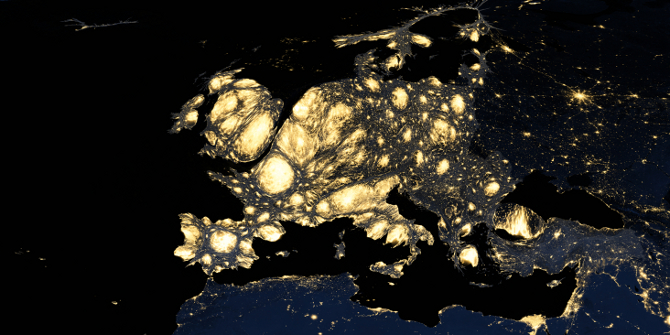 On 16 November, Klaus Iohannis was elected as the next President of Romania, defeating the country’s Prime Minister, Victor Ponta, in what many observers saw as a surprise result. Clara Volintiru writes that Romanian politics is now at a crossroads, with deep divisions between parties and widespread mistrust of politicians likely to lead to a recalibration of the country’s party system.
On 16 November, Klaus Iohannis was elected as the next President of Romania, defeating the country’s Prime Minister, Victor Ponta, in what many observers saw as a surprise result. Clara Volintiru writes that Romanian politics is now at a crossroads, with deep divisions between parties and widespread mistrust of politicians likely to lead to a recalibration of the country’s party system.
In Romania in 1992, in University Square (the main square of the capital), three sisters met by chance at the time of the first post-communist presidential elections. Two were supporting one candidate, and the third another. While they were inseparable for most of their difficult lives, on this occasion they passed each other like strangers on account of their political differences. With subsequent elections, the deep trenches within Romanian society produced by political contests have become more and more visible.
Against this backdrop, the victory for Klaus Iohannis in the 2014 presidential election on 16 November was the most accommodating outcome, preventing further protests. Yet from now on it is extremely important that politicians attempt to reconcile, rather than profit from, the Romanian electorate’s ever more divided stances.
The 2014 Romanian presidential election
To say that the result of the 2014 election was a surprise is not strictly true, as those of us on the ground in the country witnessed the fervency surrounding Iohannis rising at dinner parties, in the streets, on social-networks, on campuses and elsewhere. Nevertheless, from a political science perspective the result was indeed a huge surprise in a different sense, given that no opinion polling predicted either the massive increase in turnout or the unprecedented determination shown by young voters across the globe (the diaspora) to participate.
Beyond anecdotes and pictures of fervent crowds supporting either one of the leading candidates, the sixth post-communist presidential election in Romania is a story of numbers and innovative channels for electoral mobilisation (i.e. social media) in the post-mass-party era. From street protests in 2012, to various civic movements around issues such as stray dogs and the controversial mining project Roșia Montană, to rising support for independent candidates; the Romanian electorate seems poised to assume political engagement, along the lines of a civic duty.
In the week following the result, the international community has been searching for a conclusion. Some observers have viewed the election as a test of maturity, while most point to the apparent underlying role played by Romania’s numerous corruption scandals. Although these are pieces of the Romanian political context, there are also much deeper structural drivers at play.
First, the election was less a test of maturity and more a test of emotion. It was the emotions of voters that changed fundamentally in the campaign and altered the result from the lead held by Romania’s Prime Minister Victor Ponta after the first round, to the eventual victory by Iohannis in the second round of voting. The massive mobilisation effort and the multiplication effects which subsequently occurred were only possible because of emotion, via an incremental coagulation of thoughts and hopes. More specifically, it wasn’t only the approximately 300,000 voters in the diaspora who shaped the result, but their friends, families and acquaintances that pooled together around an additional 1 million votes for Iohannis, thus closing the race in his favour.
Second, the country’s corruption scandals and concern over the independence of the judiciary should not be viewed as a cause of political tensions, but as a consequence of the heightened posturing between Romanian political parties. Clientelism, patronage and proprietary use of public resources have become deeply embedded in the Romanian administration. Recent prosecutions which have taken place over these issues amount to little more than public displays, driven by political parties’ willingness to reform in an attempt to win back the confidence of voters. None of the candidates competing in the election could claim to be fully independent from this background, given they had all served in one capacity or another within recent administrations.
Third, the main political parties in Romania have only Pyrrhic victories to show for the last decade and it is increasingly likely that the country’s political scene will undergo significant change in the near future. Some of the more astute political figures will survive the massive crisis of trust which exists between voters and politicians, but most will fall in parliamentary lists, or judicial enquiries.
To some extent this collapse was avoidable at every turn, but within the current setting there is now far too hungry an appetite for radical change. And this change does not mean the mere substitution of one party for another, but rather replacing existing parties with something else entirely. Those who fear a descent into anarchy have good reason to do so, for Romania is now in a position where whoever fills the current political void will determine the country’s immediate future. This includes existing political leaders and emerging ones – the competition is wide open.
Finally, this type of recalibration of the political system can bring out the best in the political class, and may even re-professionalise the political elite, breaking its link with private interests and ‘discretionary’ governance. But it could also lead to the dissolution of everything that Romania has so far achieved through successive political cycles – economic, civic, institutional and geographic advancements. Although many disparities persist, and while there are many institutional distortions to be corrected, it would be a huge mistake to entertain the idea that there is an overall imbalance or instability within the country. Particularly now, within the context of developing regional tensions, Romania cannot afford to be seen as weak or divided.
The main problem ahead for the new President will be whether he can remain faithful to his electorate and use the trust invested in him to lead the presidential office with objective distance from the tussles between political parties. Alternatively, he could yet be faithful to his political party, the newly formed liberal alliance, for their support, opting to use the presidency to help groom the party to take over governmental power in the future.
For Romania’s defeated Prime Minister, Victor Ponta, the key issue will be whether his Social Democrats can survive losing the presidential election. The party has lost presidential elections before, most recently in 2009, without it damaging their overall electoral position, yet the loss of organisational capacity apparent in the 2014 vote is unprecedented. While Ponta secured close to the traditional average of 5 million votes, and did not score lower than his predecessors, he nevertheless showed significant weakness in terms of organisational control and the capacity to mobilise voters.
Please read our comments policy before commenting.
Note: This article gives the views of the author, and not the position of EUROPP – European Politics and Policy, nor of the London School of Economics. Featured image credit: Thomas Hackl (CC-BY-SA-3.0)
Shortened URL for this post: http://bit.ly/1vFbbAV
_________________________________
 Clara Volintiru – LSE Government
Clara Volintiru – LSE Government
Clara Volintiru has a PhD in Political Economy, and is currently a PhD candidate in Political Science at the Government Department, LSE. She holds an MSc in Comparative Politics, from the LSE, and an MBA from CNAM, Paris. Currently, she is associate analyst for PRIAD. Her research is focused on political parties in new democracies, informal politics and institutionalism—topics covered in various articles and books.




